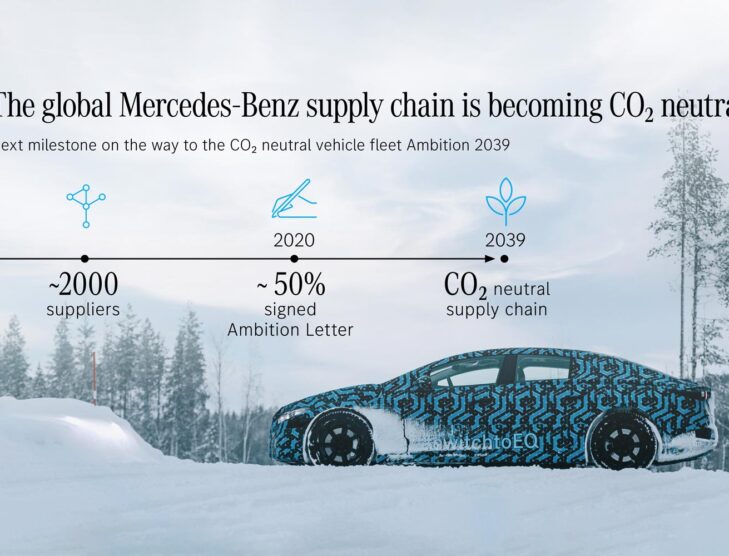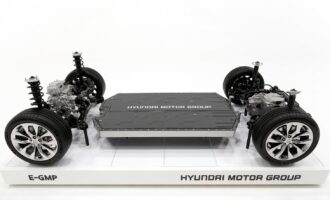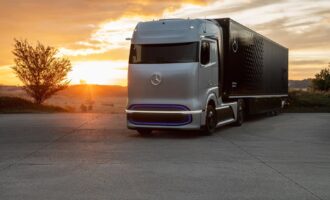
Mercedes-Benz to require global suppliers to be CO2 neutral
Mercedes-Benz is transforming its global supply chain to become CO2 neutral. The supplier network is a key element for achieving the climate goals of Mercedes-Benz due to the higher energy demand in the production of fully electric vehicles.
The transformation to electric mobility increases the energy demand in the supply chain. Compared to a conventional combustion engine, the production of an all-electric vehicle is twice as CO2 intensive, mainly because of the lithium-ion batteries.
Despite a higher energy demand in production, Mercedes-Benz plug-in hybrids and electric vehicles offer a clear advantage in terms of CO2 emissions compared to conventional drives already today.
Electric vehicles can make up for a large part of the initially higher CO2 emissions from the upstream value chain due to their emission-free driving. This is where Mercedes-Benz comes in and works with the global supplier network to reduce CO2 emissions in the production phase.
“Almost half of our approximately 2000 suppliers have signed an ‘Ambition Letter of Intent’ and are committed to supplying us with only CO2 neutral parts in the future. These companies account for more than half of the annual purchasing value of Mercedes-Benz AG,” said Gunnar Güthenke, head of Procurement and Supplier Quality, Mercedes-Benz Cars.
The company is in close dialogue with all other suppliers to jointly develop strategies for CO2 reduction.
“We are also in the process of setting up a tracking system that will enable us to see how CO2 emissions are reduced over time,” he said.
Climate-neutrality is incorporated into contractual terms, and the Ambition Letter is a key criterion for awarding contracts. From 2039 at the latest, only production materials which are CO2 neutral in all value creation stages will be allowed through the factory gates of Mercedes-Benz. A supplier declining to sign the Ambition letter will not be taken into account for new supply contracts.
Focus on CO2-intensive components and materials
Mercedes-Benz will additionally focus on materials and components that are particularly CO2 intensive in manufacturing and processing until 2039. Focus components include battery cells, steel, and aluminium. These components account for about 80% of the CO2 emissions in the supply chain of a fully electric vehicle. Mercedes-Benz has already agreed on clear objectives with two strategic partners for battery cells: CATL (Contemporary Amperex Technology Co., Limited) and Farasis Energy have committed to supply battery cells that are produced using electricity from renewable sources such as hydropower, wind, and solar energy. This reduces the CO2 footprint of an entire battery by more than 30%. The rest of the supply chain will be included as a next step.
A holistic approach to environmental impact also includes the sustainable use of resources. The company’s goal is to consistently reduce the use of primary raw materials for electric drives by 2030 and gradually increase the share of secondary and renewable materials in vehicles. Mercedes-Benz is working with its partners to gradually increase the share of secondary material in the focus materials.
Mercedes-Benz plants as role model
Mercedes-Benz AG’s own plants, including the global battery production network, will produce on a CO2 neutral basis worldwide already from 2022. This will make them role models for the supplier network. In line with the procedure in Mercedes-Benz’s own plants, suppliers are required to avoid and reduce emissions as a fundamental principle. Only then can compensation via high-value projects be considered. The areas of approach for climate-neutral production are diverse, and range from reducing consumption to purchasing energy from renewable energy sources.
Ambition 2039: Climate-neutrality along the entire value creation chain
With its new strategy, Mercedes-Benz has introduced its claim to produce the world’s most desirable cars. Sustainability extends as a guiding principle across all strategic fields. The goal is a fully networked and completely CO2 neutral vehicle fleet. Ambition 2039 gives the direction for this along the entire value creation. The company aims to have plug-in hybrids or all-electric vehicles to make up more than 50% of its car sales by 2030. Major milestones include CO2 worldwide neutral production in all of Mercedes-Benz AG’s own plants from 2022, involvement in shaping the charging infrastructure and agreeing to specific CO2 measures with suppliers.









